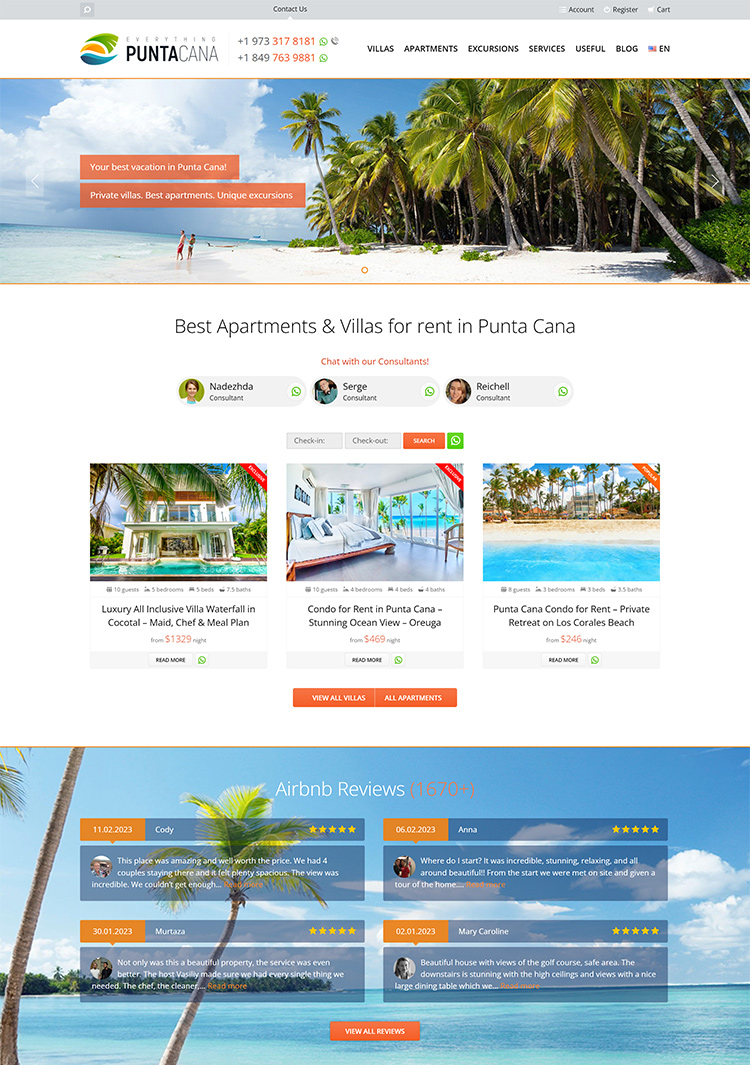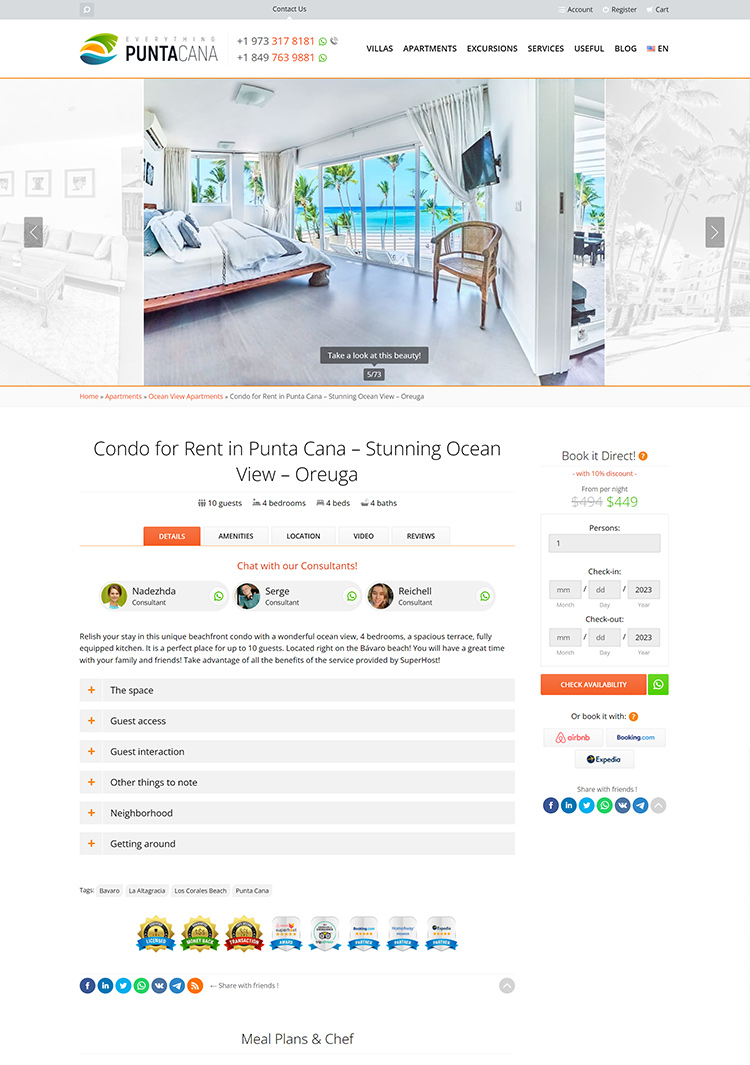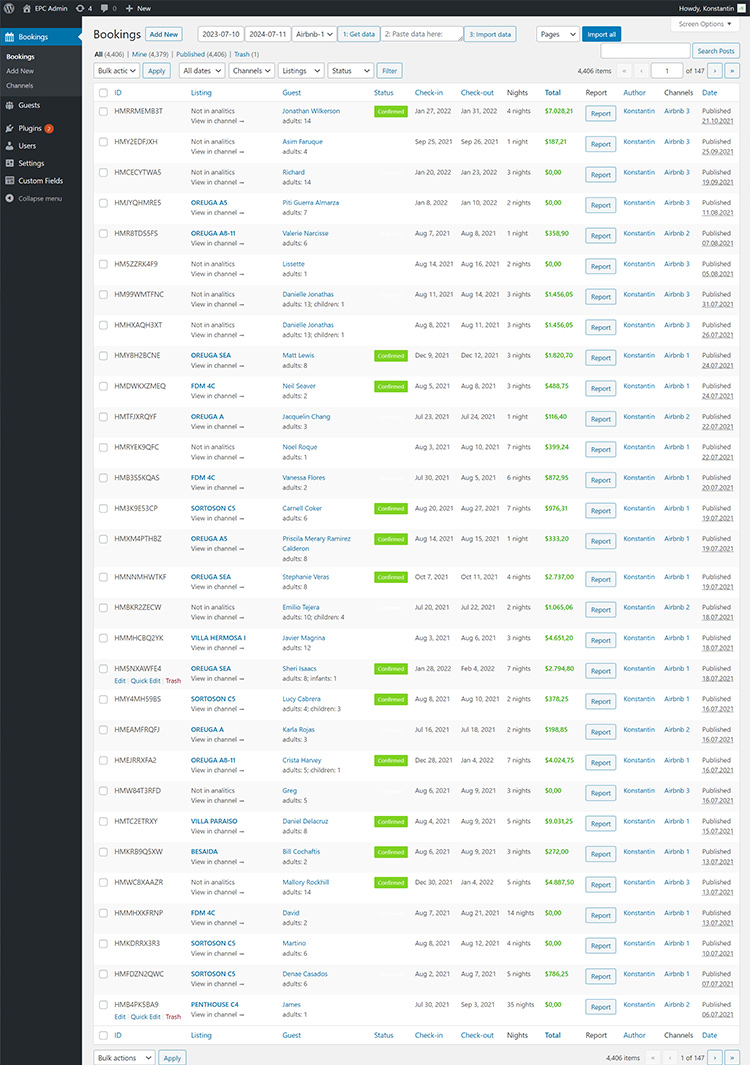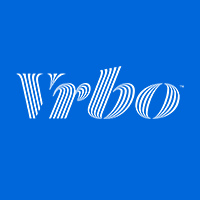Airbnb Direct Booking Website Developing
With Data Transfer & Synchronization
The Key Features of the Package
Unique Design
Data Transfer
Data Syncronization
Payment Modules
From 14,750 $12,850 /website
Key Elements of a Successful
Direct Booking Website
Direct Booking Websites We Create
We offer access to the admin panel, enabling personal verification of your website’s functionality








How Do We Work
Reasons to Create Your Own
Direct Booking Website
We Work With Top OTA Companies
With a decade of experience working with leading OTAs, we guarantee outstanding service
Frequently Asked Questions
Can I receive ongoing support for my airbnb direct booking website?
Yes, we offer continuous support for your website to quickly fix technical problems and make updates. Our support team is here to help with any questions or changes you need, letting you concentrate on running your rental property while we handle the website maintenance and support.
What is an example of a direct booking?
An example of a direct booking is when a guest visits a hotel’s website, finds a room they’d like to stay in, and completes the reservation process through the site itself.
They might use the hotel’s online booking form, input their stay dates, select a room type, and enter payment information directly on the hotel’s platform, thereby booking their stay without the involvement of third-party travel agencies or booking sites like Booking.com or Expedia.
Do I need a website for my Airbnb listing?
Certainly! If you desire a sustainable approach to your future business and aim to establish meaningful relationships with your guests.
A personal website can complement your Airbnb listing by offering a direct channel for bookings and an opportunity to showcase your property more extensively.
Why booking direct is better?
Booking direct often provides customers with more personal, flexible service, and can come with perks like special discounts, complimentary upgrades, or added amenities not available through third-party platforms.
Direct booking avoids the commissions charged by platforms like Airbnb, which can range from 15% to 20%, potentially leading to better deals.
How does direct booking work?
Direct booking involves transactions made directly between guests and property owners or managers, bypassing third-party intermediaries.
Customers visit the property’s website, check availability, and book their stay directly. Payment is usually processed through the website’s booking system.
What are the 2 types of booking system?
There are two main booking systems: direct booking, where guests book through the property’s own website, and third-party booking, where bookings are made through external platforms or travel agents.
Should I book through Airbnb or directly?
Booking directly may offer better rates and more direct communication with the host. However, Airbnb provides a standardized booking process, a degree of security, and a resolution center for disputes.
The choice depends on personal preference for convenience, price, and service level.
Is it expensive to host your own direct booking website?
The cost varies widely depending on website complexity, booking system integration, and hosting services. Basic websites can start from a few hundred dollars, while more sophisticated setups with custom booking engines might cost several thousand.
Ongoing costs for maintenance, hosting, and updates should also be considered.
However, the long-term benefits of owning your website and having full control over your bookings often outweigh the initial investment.
Can you have your own website with Airbnb?
Yes, property owners can have their website in addition to listing on Airbnb. A personal website can offer more control over the booking process, brand presentation, and customer engagement.
What is a direct booking WordPress website?
A direct booking WordPress website is a site built on the WordPress platform, featuring integrated booking functionality. This allows guests to check availability, book their stay, and pay directly through the website. WordPress offers various plugins to facilitate this process.
Can you link your website to Airbnb?
Yes, you can link your website to your Airbnb listing. This can be done by including a direct link to your Airbnb listing on your website, making it easy for visitors to book through Airbnb if they prefer. Some website platforms also offer widgets or APIs for more seamless integration.
Will the Airbnb integration impact the performance or speed of my website?
Integrating Airbnb into your website typically has minimal impact on performance or speed. However, excessive use of external widgets or poorly optimized integrations could potentially slow down your site. Ensuring that the integration is done efficiently can mitigate these risks.
Is it possible to customize the Airbnb integration to match my website's design?
Yes, it is often possible to customize the Airbnb integration to match your website’s design. Many integration tools and widgets allow for customization of appearance to ensure consistency with your site’s branding and layout.
Does Airbnb integration allow visitors to book accommodations directly on my website?
Airbnb integration usually directs visitors to Airbnb’s website to complete their booking. However, certain tools and plugins may allow for a more integrated experience, displaying availability and prices on your website before redirecting users to Airbnb for booking.
Benefits of an Airbnb Direct Booking Website
Save on Fees
Avoid high commission fees charged by OTAs like Airbnb and Booking.com, allowing for better profit margins or the option to offer discounts to your guests.
Enhanced Brand Identity
Create a unique user experience that showcases your property’s personality and values, differentiating your offerings in a crowded market.
Direct Marketing Opportunities
Engage directly with potential and returning guests through tailored offers, loyalty programs, and personalized communication.
Greater Control
Full autonomy over your booking calendar, pricing strategy, and guest interactions, allowing for a more tailored and responsive service.
Transparent Policies
Set and communicate your own cancellation and booking policies directly with guests, ensuring clarity and mutual understanding.
Showcase Property Uniquely
Display your property’s unique features, history, and charm without the constraints of OTA listing formats.
Improved Communication
Establish a direct line of communication for gathering guest feedback, addressing concerns, and fostering repeat business.
SEO and Visibility
Enhance your online presence through search engine optimization, reaching the right audience and increasing bookings.
Property Security
Implement your own guest screening process, enhancing the security and safety of your property.
Dynamic Availability
Easily update your availability and manage bookings in real-time, offering flexibility to both you and your guests.
Exclusive Offers
Access special offers and unique features available only through direct booking websites, enhancing your travel experience.
Early Access to Promotions
Get early notifications about promotions and the opportunity to book before these offers are available to the wider public.
Personalized Customer Support
Enjoy personalized customer support, with direct channels such as WhatsApp for real-time assistance during your stay.
Customized Travel Experience
Customize your travel experience with additional services, such as local tours or dining recommendations, tailored to your preferences.
Show all ↓
Direct Booking Website Development - Key Strategies and Insights
Understanding Direct Booking and Airbnb’s Model
Direct booking on platforms like Airbnb represents a streamlined approach for guests to reserve accommodations directly, eliminating intermediaries for more personal interaction between hosts and guests. This method contrasts with Airbnb’s typical model, which acts as a third-party intermediary by facilitating bookings on its platform.
What Direct Booking Sites Offer
A direct booking site enables property owners to take reservations directly from guests, bypassing platforms like Airbnb. This model promotes direct communication and potentially lower costs by avoiding third-party fees.
Key distinctions include:
- Lower fees for both guests and hosts, enhancing profitability and affordability.
- Enhanced communication between guests and hosts for a more personalized service.
Direct vs. Indirect Bookings
Understanding the nuances between direct and indirect bookings is crucial for hosts considering their booking website. Direct bookings occur when guests book directly with the host, while indirect bookings involve third-party platforms like Airbnb. The benefits of direct booking include cost savings and personalized experiences.
Integration with Airbnb’s API
For those looking to combine the best of both worlds, integrating a direct booking site with Airbnb’s API can ensure seamless operations. This allows for real-time updates and management across both direct and Airbnb platforms. However, it’s important to adhere to Airbnb’s technical and policy guidelines for a smooth integration.
Legal Considerations
Setting up a direct booking site requires careful consideration of legal requirements:
- Compliance with local regulations and tax obligations.
- Ensuring data protection for users.
The move towards direct booking platforms offers significant advantages, including lower operational costs, improved guest-host communication, and a more personalized booking experience.
By effectively integrating with platforms like Airbnb, hosts can manage their listings efficiently across multiple channels. However, navigating the legal landscape is crucial for operating within the law and ensuring guest privacy.
For those interested in launching a direct booking website, the appeal lies in the autonomy it provides, allowing for a more tailored guest experience and operational efficiencies. Embracing the direct booking model, alongside the strategic use of platforms like Airbnb, can significantly enhance the visibility and profitability of rental properties.
The key to success lies in effective integration, legal compliance, and leveraging the unique advantages that direct bookings offer.
Advantages of Direct Booking
Direct booking presents several advantages for both guests and property owners, especially when compared to using intermediary platforms like Airbnb. Understanding why direct booking is often considered better can help property owners make informed decisions about how to manage their bookings.
Preference for Direct Booking
Hotels and property owners generally prefer direct bookings for several reasons:
- Reduced Fees: Direct bookings eliminate the commission fees charged by platforms like Airbnb, resulting in higher profitability for property owners.
- Increased Control: Direct communication with guests enables a more personalized service, enhancing the guest experience and building loyalty.
- Operational Efficiency: Managing bookings directly can streamline operations, reducing the complexity and cost associated with using multiple platforms.
Operational Cost Reduction
Direct booking can significantly reduce operational costs compared to using platforms like Airbnb. By avoiding platform fees and leveraging direct communication for more efficient management, property owners can achieve greater cost-effectiveness. This includes optimizing occupancy rates and minimizing administrative overhead.
Long-term Benefits of a Strong Direct Booking Presence
Establishing a strong direct booking presence online offers long-term benefits that extend beyond immediate cost savings:
- Brand Building: Direct booking platforms allow properties to establish their brand, differentiating themselves in a competitive market.
- Customer Loyalty: Direct interaction fosters a deeper connection with guests, encouraging repeat bookings and referrals.
- Data Insights: Direct bookings provide valuable data on guest preferences and behavior, enabling targeted marketing and service improvements.
The advantages of direct booking are clear, from reduced operational costs to improved guest experiences and long-term brand loyalty. For property owners, investing in a direct booking strategy is not just about cutting out intermediary fees; it’s about taking control of the guest relationship and optimizing their business for success in the competitive hospitality market.
Direct booking stands out as a strategic choice for hotels and rental property owners looking to maximize profitability, enhance guest satisfaction, and build a strong online presence. By focusing on direct bookings, property owners can leverage these advantages to achieve sustainable growth and a competitive edge.
Implementing Direct Booking Features
Achieving success with direct bookings for short-term rentals involves creating a user-friendly booking system, optimizing your listing for instant bookings on platforms like Airbnb, and ensuring your website or app is accessible and mobile-friendly.
Creating a Direct Booking System
To create a booking system website, you should focus on:
- Understanding the needs of your target audience to ensure the system meets their expectations.
- Utilizing web development tools or platforms that specialize in e-commerce or booking systems.
- Incorporating features such as calendar integration, payment processing, and automated confirmation emails.
For those wondering about building their booking app, it’s entirely feasible with the right development skills or by partnering with app developers. This approach allows for tailored solutions that can directly address your property’s unique needs.
Instant Booking on Airbnb
Instant booking on Airbnb can be enabled by adjusting your listing settings, allowing guests to book your property without prior approval. This feature is beneficial for attracting guests who prefer making immediate reservations.
To ensure you attract long bookings as well, consider setting discounts for extended stays and highlighting amenities that are important for longer stays, such as high-speed internet and kitchen facilities.
Integration with Airbnb
Yes, Airbnb offers an API that can be used to integrate your direct booking system with their platform, allowing for real-time synchronization of bookings and listings. This is crucial for maintaining consistency and avoiding double bookings.
Essential Features for a Direct Booking Website
A successful direct booking website should include:
- User-friendly interface for easy navigation.
- Responsive design for mobile and tablet users.
- Clear descriptions, high-quality images, and transparent pricing.
- Secure payment gateway integration.
- SEO optimization to enhance visibility.
Optimizing for Mobile and Accessibility
Ensuring your direct booking site is mobile-friendly and accessible involves:
- Implementing a responsive web design that adapts to various screen sizes.
- Following web accessibility guidelines to accommodate all users, including those with disabilities.
Conversion Rate Optimization Strategies
To optimize the direct booking conversion rate, consider:
- Employing high-quality images and engaging descriptions to highlight your property’s best features.
- Offering special promotions or discounts to encourage direct bookings.
- Collecting and showcasing positive reviews from past guests.
- Utilizing analytics to understand user behavior and refine your marketing strategies.
The implementation of direct booking features, from creating a user-friendly website or app to integrating with platforms like Airbnb, is crucial for attracting and retaining guests. Emphasizing mobile-friendliness and accessibility, alongside optimizing your direct booking conversion rate, can significantly enhance the user experience and boost your bookings.
Incorporating essential features such as secure payment options, clear property descriptions, and responsive design will ensure your direct booking platform stands out in the competitive short-term rental market.
Focusing on these elements will not only improve the functionality of your direct booking platform but also contribute to a smoother, more enjoyable booking experience for your guests, leading to increased satisfaction and repeat bookings.
Booking Systems and Technologies Simplified
Digital booking landscapes offer a range of tools from comprehensive platforms by tech giants to specialized software for specific sectors. Here’s a clear and straightforward guide for developing or enhancing a direct booking website, without any unnecessary details.
Key Booking Systems
- Google: While not offering a standalone free booking system, it provides tools enhancing booking functionalities.
- Wix Booking System: Suitable for small businesses and individual users for managing appointments and reservations.
Technologies for Hotel and Accommodation Bookings
- Central Reservation System (CRS): Manages inventory and reservations across channels in the hotel industry.
- Direct Booking Technology: Enables guests to book directly, offering a seamless and personalized experience.
- CRM Booking: Focuses on personalizing the guest experience through effective data and interaction management.
Building a Platform Like Airbnb
- Website Building: Airbnb’s complex platform suggests custom solutions, though specifics are not public.
- WordPress and HivePress: These tools allow for creating a marketplace for bookings, similar to Airbnb, at no cost.
- Software Architecture: Airbnb’s use of a microservices approach hints at a scalable and flexible design.
Advancing with Emerging Technologies
- Blockchain Technology: Enhances security and trust through transparent, tamper-proof transaction and review systems.
- Artificial Intelligence (AI): Personalizes guest experiences by analyzing data to tailor services and recommendations.
By leveraging data analytics, direct booking sites can engage customers more effectively, adapting offerings and marketing to align with user preferences. This strategic use of technology not only improves operational efficiency but also elevates the user experience, fostering greater satisfaction and loyalty among guests.
Developing Your Booking Website
Creating a website like Airbnb involves careful planning, strategic development, and ongoing optimization to ensure success. For Airbnb hosts, developing a direct booking website offers numerous benefits, including greater control over the booking process, reduced dependency on third-party platforms, and the potential for higher profit margins.
Should You Create a Website for Your Airbnb?
Yes, establishing a direct booking website for your Airbnb property can significantly enhance your rental business. It provides a platform to showcase your property uniquely, offers personalized experiences to your guests, and reduces the fees associated with third-party booking platforms.
Key Steps in the Development Process
The development process of a direct booking website involves several critical steps:
- Planning: Define your goals, target audience, and unique selling points (USPs).
- Design: Focus on user-friendly design that reflects your brand and makes navigation easy for visitors.
- Development: Build the site with a robust content management system (CMS) and ensure it’s mobile-responsive.
- Payment Integration: Implement secure payment gateways to process bookings directly.
- Testing: Rigorously test your site to ensure it’s bug-free and provides a smooth user experience.
- Launch: Deploy your website and monitor its performance closely, making improvements as needed.
SEO-Optimization for Your Direct Booking Website
SEO optimization is crucial for attracting more direct traffic to your website. Implementing effective SEO strategies can enhance your site’s visibility on search engines, driving more organic traffic. Key strategies include:
- Use relevant keywords in your content and meta tags.
- Creating quality content that provides value to your visitors.
- Ensuring your website is fast, mobile-friendly, and secure.
- Building backlinks from reputable sites within the travel and hospitality industry.
- Maintaining an active presence on social media to drive traffic to your site.
Developing a direct booking website for your Airbnb property can be a game-changer, offering more control over the booking process and the potential for increased revenue. The key to success lies in careful planning, user-friendly design, secure payment integration, and rigorous testing. Additionally, implementing robust SEO strategies will ensure your site attracts more direct traffic, ultimately boosting your bookings and profitability.
By taking these steps, you can create a powerful direct booking website that stands out in the competitive travel and hospitality market, offering guests a unique and personalized booking experience.
Modeling and Strategy
Direct modeling in the context of booking websites involves creating flexible and adaptable booking systems that allow for immediate updates and changes without the need for predefined parameters. This approach contrasts with parametric modeling, which relies on predefined constraints and relationships to determine the behavior of the model.
Direct modeling is particularly useful for managing unique, one-off changes or updates, providing a level of agility that parametric models cannot.
Direct Modeling Examples and Strategies
Examples of direct modeling include:
- A booking website allows for instant updates to room availability or prices based on changing conditions.
- Implementing dynamic pricing models that adjust prices in real time based on demand, competition, and other external factors.
Direct modeling strategies can significantly enhance the operational flexibility of direct booking websites, enabling them to respond swiftly to market changes.
Parametric vs. Direct Modeling
The main difference between parametric and direct modeling lies in their approach to change management:
- Parametric modeling is rule-based, making it ideal for scenarios where relationships and constraints are known and consistent.
- Direct modeling offers greater flexibility, allowing for quick adjustments without the need to modify the entire model, perfect for dynamic and uncertain environments like the hospitality industry.
Dynamic Pricing and Marketing Strategies
Direct booking websites can leverage dynamic pricing models to maximize revenue by adjusting prices based on demand, seasonality, and competitor pricing. Effective marketing strategies for promoting these platforms include:
- Utilizing SEO to improve visibility.
- Engaging with customers through social media and email marketing.
- Offering exclusive deals or rewards for direct bookings.
Revenue and Business Model
Passive booking refers to reservations made without active engagement from the property owner, often through automated systems or third-party platforms. The four kinds of bookings typically include direct, indirect, passive, and active bookings, each offering different levels of engagement and control for both guests and hosts.
Revenue Generation and Monetization Models
Airbnb generates revenue primarily through service fees charged to both hosts and guests. For direct booking websites, effective monetization models might include:
- Commission on bookings.
- Subscription fees for premium listings.
- Ancillary services like cleaning or property management.
Competitive Advantages Of Airbnb
Direct booking platforms can offer competitive advantages to property owners by:
- Reducing or eliminating booking fees, increasing profitability.
- Providing more control over listings and guest interactions.
- Offering personalized marketing strategies to highlight unique property features.
Direct modeling strategies, combined with dynamic pricing and effective marketing, can significantly enhance the appeal and profitability of direct booking websites. By offering competitive advantages such as lower fees and greater control over listings, these platforms present a compelling alternative to traditional third-party booking sites like Airbnb.
Success in this space requires a flexible approach to pricing and promotions, alongside a clear understanding of the benefits and limitations of different booking models.
These strategies and models underscore the importance of agility and customer engagement in the competitive landscape of direct booking platforms. By focusing on the unique needs and preferences of property owners and guests, direct booking sites can carve out a niche that offers distinct advantages over traditional models, potentially reshaping the future of the hospitality industry.
User Experience and Accessibility
Direct booking websites can outperform traditional booking platforms by focusing on a superior user experience, which includes intuitive design, personalized options, and responsive customer service. Ensuring accessibility for users with disabilities is paramount, involving compliance with web accessibility standards like the Web Content Accessibility Guidelines (WCAG). Best practices include:
- Implementing screen reader compatibility.
- Ensuring keyboard navigation throughout the site.
- Providing alternative text for images and media.
- Using sufficient contrast ratios for text and background colors.
Security and Payment Processing
Ensuring the security of payment transactions is critical for maintaining trust. Best practices for secure payment processing on direct booking sites include:
- Utilizing SSL encryption for data protection.
- Adhering to Payment Card Industry Data Security Standards (PCI DSS).
- Implementing two-factor authentication (2FA) for user accounts.
To protect against fraud and unauthorized bookings, direct booking platforms should employ:
- Real-time fraud detection tools.
- Verification processes for both hosts and guests.
- Secure and up-to-date payment gateways.
Integration and Partnerships
Integrating with other travel and hospitality services enhances the customer experience by offering a more holistic view of travel planning. This can include:
- Linking with flight booking services for package deals.
- Partnering with local experience providers to offer unique activities.
- Integrating with car rental services for seamless travel experiences.
Partnership opportunities for direct booking platforms may involve:
- Collaborating with tourist boards for promotional offers.
- Engaging with event organizers for accommodation partnerships.
- Working with travel insurance companies to offer comprehensive travel packages.
Focusing on user experience and accessibility, ensuring secure transactions, and fostering strategic partnerships are essential strategies for direct booking websites aiming to provide value beyond traditional booking platforms. By addressing these key areas, direct booking platforms can enhance their appeal, increase their user base, and ultimately drive more bookings, offering a competitive edge in the travel and hospitality market.
Show all ↓
Order Airbnb Direct Booking Website
We’re here to answer your questions and clarify details about our services and pricing












